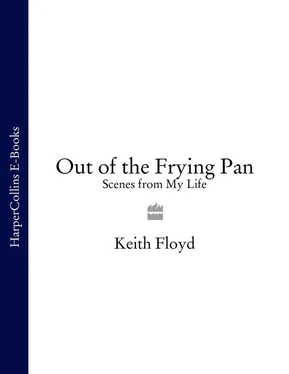At the time I thought all these activities, the mushroom gathering, the odd jobs and so on, were great fun and all part of a country childhood, but of course, there was in fact a genuine financial necessity for such produce as could be gathered for free, and such cash as you earned odd jobbing went into the family purse. Once a year there was great money to be earned, from a week’s potato picking, ten or twelve of us in line behind the tractors; more important to my parents, though, was the bonus of a hundredweight of spuds.
My great boyhood chum was a farmer’s son called Linn Ransey. He too worked on the farm during the holidays, but all of our free time was spent at the riverbank. As farmers they were comfortably off and it was always a great moment when I was invited to stay for lunch or tea in the big farmhouse kitchen with the big scrubbed kitchen table. Stuffed fish, caught by Mr Ransey, an expert angler who also made our fishing rods for us, were hung on the walls. If I was asked to stay for tea, we would invariably have a game of cricket or rounders, and I did everything I could to delay the four-mile journey home, and for fear of being scolded for being late, I used to pick bunches of wild flowers, hoping to appease my anxious mother on my return.
It was about now that I became aware that my new life at Wellington School was hugely different from my life at home, and I am ashamed to say, I went through a phase of being embarrassed by my parents’ modest means and lifestyle. Now well and truly into long trousers, other boys were sporting worsted blazers and finely woven flannels while I was having to make do with the standard serge blazer and thick grey trousers. Also I was growing dissatisfied, not to say resentful, that I never quite managed any of the school trips abroad. This growing resentment came to a head in my last term at school (I was to leave at sixteen, to my great disappointment – I wasn’t considered bright enough to justify the continuation of increasing school fees) when, without consulting my father, I ordered a fine double-breasted blazer, a fine pair of flannels and some Oxford-toed shoes from the school shop.
I think my parents were a little disheartened when they read my final school report and analysed my four meagre O levels, but they were both furious and frightened when they opened the final school bill. My sartorial shopping expedition put the family finances under extreme pressure. I had, it turned out, as my ashen-faced father told me, spent more money on clothes in one hour than he earned in over a month. Not a happy start for an unemployed school leaver about to foray into grown-up life.
Nearly forty years later I still have the same problem with tailors, shoemakers and shirt shops! I can’t resist shopping.
During my last couple of terms at Wellington my father was made redundant in Taunton and was offered relocation to either Newton Abbot in Devon or Bristol. Although I think they would have preferred to stay in Somerset they elected to go to Bristol, where they thought both Brenda and I would have much better career prospects. Thanks to my father’s industriousness and careful management he was able to obtain a mortgage to buy a council house in Sea Mills from the Bristol Corporation. It was a great leap forward for my parents to own their own house. I, unfortunately, was devastated, for the most appallingly wrong reasons of social status. Despite their best efforts to be fair and tolerant my relationship with my parents deteriorated for the next three or four years and were amongst the worst in my life.
I was angry and frustrated because the aspirations instilled in me at Wellington were at loggerheads with post-school reality. I needed a job quickly as I had to repay the money for the dreaded blazer. My parents, ever cautious, tried to persuade me to take a clerk’s job with the Bristol Corporation or the Electricity Board or the GPO, the sort of dull, meaningless job from which you could never be sacked, and end up with a silver watch and a modest pension. I spent two desperately unhappy months filing plans in the Bristol Corporation’s Department of Architecture for the princely sum of £4 7s 8d per week.
At the same time, at just sixteen, I discovered the alluring demimonde of a Clifton coffee bar – at that time in Bristol there were one or two very basic Indian restaurants, one or two appallingly basic Chinese restaurants, the aforementioned coffee bars and omelette bars. For the grown up and affluent there were restaurants just emerging such as the steak bars, started by the Berni Brothers. Bistros, brasseries, wine bars and so forth were still nonexistent, and as for pubs, which I as a spotty, skinny youth of sixteen was unable to enter, they served no food beyond crisps, pickled eggs and a pork pie. So my evenings were spent sipping a cold glass cup of frothy coffee whilst listening to the jazz and blues played on a record player, marvelling at the sophisticated university students and what I took to be painters, writers and artists discussing continental films that were shown at the Tatler Cinema, as they puffed on Gauloises and Gitanes. I was so young and they seemed so old. I could not see a way to cross the bridge that seemed to span the wide gap between me and them.
I had somehow acquired a Vespa motor scooter and for some odd reason I had been persuaded to join a youth club favoured by the middle-class kids from the houses on the private estates that ringed my council estate. These kids all had driving licences and borrowed their fathers’ cars on Saturday nights. I was a fish out of water both socially and intellectually (I regarded myself as intellectually superior and socially inferior) so I left.
Looking back on my life, I think I have been really quite a loner, and although the tabloid press has almost convinced even me that I am some kind of hell-raising party animal, or the hail-fellow-well-met in the bar, I have a fear of crowds and even now, at the age of well over fifty, am sometimes too shy to walk alone into a public place.
There was an awful time when I was fourteen or so, back in Wiveliscombe, and I was invited to a fancy dress party to celebrate some boy’s birthday. I was mortified when I discovered that I was the only one in fancy dress. I left the party in tears of embarrassment, roundly ridiculed by the others, and have had difficulty attending parties ever since. And the youth club experience had a profound effect on me too, with the result that I have a completely prejudiced and irrational scorn for golf clubs, darts teams, yacht clubs, Rotary clubs or committees; and even though I thoroughly enjoyed occasionally playing club rugby in Bristol – and we would always rush down after our game to the memorial ground to catch the last fifteen minutes of another Bristol victory – and, sure the few pints in the clubhouse were great, once the singing started I lived in fear of being called upon to perform. Worse still was the appalling way we behaved in the Indian restaurant later. The lads would go to the lavatory and escape through the window without paying, leaving the more timid of us protesting our innocence and insisting on paying only our own share.
After a while I washed up a couple of evenings a week in the coffee bar for ten bob a night and later I spent another two nights serving coffee and cleaning tables. In a few months I was hanging out with the students and the gap between my aspirations and my home life was further exaggerated. I wasn’t old enough to have the house key and after several nights of my parents waiting up for me, they had, as my father said, ‘to draw a line’. If I wasn’t home before they locked the door, I would have to sleep in the garden shed.
My sister was also living at home. I think she had a job demonstrating cooking appliances in an Electricity Board showroom. I seldom saw her. She, as in Wiveliscombe, had joined tennis clubs and other worthy associations and to my mind was appallingly middle class. Our paths very, very seldom crossed. Handsome young men with MGs or souped-up Minis vied to take her to dances and balls. I think she thoroughly enjoyed this time, I was desperate to leave home.
Читать дальше












